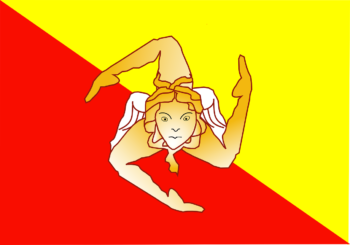Il Siciliano Posted by Bridgette on Sep 19, 2020 in Culture
Ciao di nuovo!
Today, I want to talk about the language of Sicily: u sicilianu. Some people would simply say it is a dialect of Italian, some an accent, but really – it is a language itself that is now actually recognized by UNESCO. Like perhaps some of you, the first time I went to Sicily I stared at quite a few people wide-eyed with wonder, incapable of understanding a single word of what they were saying. It was a bit frustrating to say the least, but now I have grown to really appreciate and love the uniqueness that is the Sicilian language.
As linguists understand, Sicilian is a language that actually preceded Italian and can be dated back to 700 A.D. (Remember, Dante established the Italian language in the 14th century.) Given the geographical location of Sicily, many inhabitants have passed through it throughout history, leaving their linguistic mark on the language. From the Semitic languages of Phoenician and Punic, the languages of the Carthaginians, then Greek, and then finally Latin, through the Romans.
As a language, Sicilian also has dialects derived from it. Wikipedia gives us a list of all of these as follows:
- Western Sicilian (Palermitano in Palermo, Trapanese in Trapani, Central-Western Agrigentino in Agrigento)
- Central Metafonetic (in the central part of Sicily that includes some areas of the provinces of Caltanissetta, Messina, Enna, Palermo and Agrigento)
- Southeast Metafonetic (in the Province of Ragusa and the adjoining area within the Province of Syracuse)
- Ennese (in the Province of Enna)
- Eastern Non-Metafonetic (in the area including the Metropolitan City of Catania, the second largest city in Sicily, as Catanese, and the adjoining area within the Province of Syracuse)
- Messinese (in the Metropolitan City of Messina, the third largest city in Sicily)
- Eoliano (in the Aeolian Islands)
- Pantesco (on the island of Pantelleria)
- Reggino (in the Metropolitan City of Reggio Calabria)
Now that we have established that Sicilian is in fact a language, let’s take a look at some specific expressions that you can use next time you’re there!
Nun lu capisciu – non capisco – I don’t understand
Nun lu sacciu – non lo so – I don’t know
Pi fauri, parra chiù adaciu – per favore, parla più lentamente – please speak slower
Ngrisi parri? – parli inglese? – do you speak English?
M’â scusari – scusa – sorry
Assai avi ca nun ni videmu – da quanto tempo non ti vedo – long time no see
Here is a video of a simple breakdown of some expressions in Italian and Sicilian:
Now, if you really want to laugh (and/or scratch your head) listen to these two Sicilian women present some common Sicilian (Catanese) phrases and expressions:
Allora, voi avete capito tutto o non? So, did you understand everything or not? Do you know some other Sicilian sayings? Write them down below!

Build vocabulary, practice pronunciation, and more with Transparent Language Online. Available anytime, anywhere, on any device.





Comments:
Terence Carlin:
I would recommend reading
Andrea Camilleri’s Montalbano novels they have lots of dialogue in Sicilian and they are great stories
Terence
Louise LoCascio-Matarazzo:
Please a translation of: Ti Vogio bene (Italian) and how it is pronounced in Sicilian.
R D Sansone:
@Louise LoCascio-Matarazzo Ti vogghiu beni = tee vohg-yew ben-ee
A term of affection meaning “I love you”, but not in a romantic sense. Use between a parent, and a child, friends, etc… as opposed to “Ti amu”, or “tee ah-moo” which is used in romantic exchanges 🙂
Tom Dawkes:
Thanks for this enjoyable episode … but it’s rather misleading to say that “Sicilian is a language that actually preceded Italian”. Latin developed in each area of the old Roman empire in its own way, so that from Piemonte and Veneto in the north to Sicily in the south there were locally various forms of speech, which naturally diverged from each other, and some became written languages for administration and culture in their own right (Veneziano, Bolognese, Milanes, Napoletano to mention only the most important). You could have mentioned that Siciliano was the preferred medium for the poetic school of Frederick II and his son Manfred: see https://www.treccani.it/enciclopedia/scuola-siciliana or https://en.wikipedia.org/wiki/Sicilian_School
Ian McNeil:
Molto interessante ! Ho visitato la Sicilia qualche volte e sono fascinato per la storia e l’architettura del paese . Ho saputo della lingua siciliano ma questo e il primo tempo che l’ho ascoltato parlare . Grazie mille .